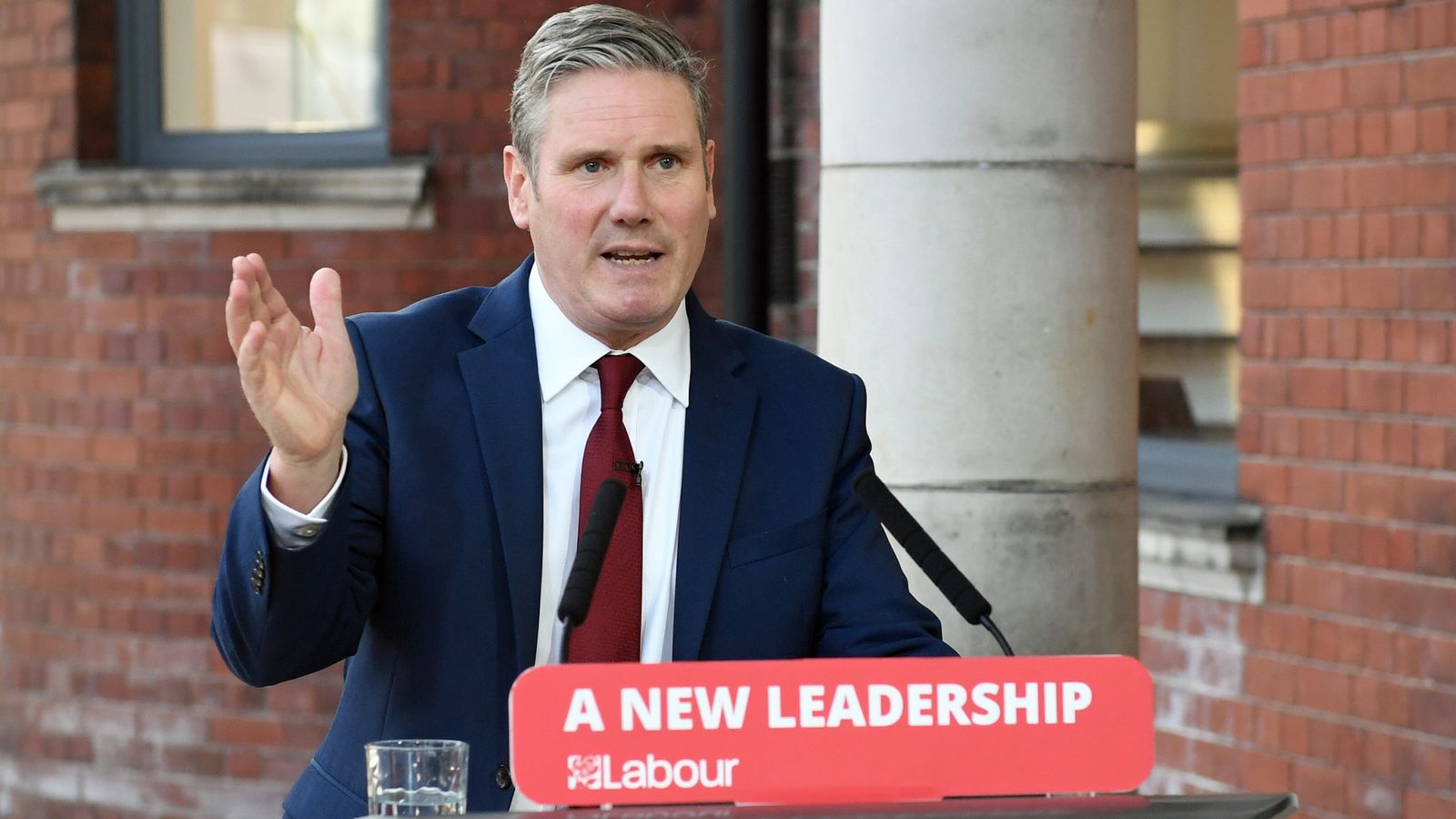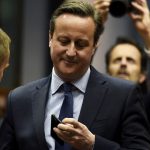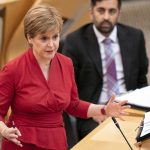Sir Keir Starmer became Labour leader a year ago on 4 April, Grand National Day. The past 12 months have been full of challenging hurdles.
There are more to come, too.
After hitting the front early on in his leadership and establishing a lead over Boris Johnson and the Tories in opinion polls, Sir Keir has now fallen behind in the race for No 10.
Please use Chrome browser for a more accessible video player
So in a year in which COVID has overshadowed all else in politics, is it fair to describe Sir Keir as an unlucky leader?
Probably. But then successful leaders often make their own luck.
Since becoming leader a year ago, as he regularly points out, Sir Keir has yet to make a speech to a real audience. Everything is on Zoom, usually delivered from a makeshift TV studio inside Labour HQ, but sometimes from his home.
To those critics who say Sir Keir lacks passion, his supporters would say: “You try making a passionate speech in an empty room!” And they’d be right.
For a new leader impatiently anxious to introduce himself not just to his party but also the electorate, there have been no opportunities for public speeches, rallies or party conferences.
No chance to meet the party faithful, woo the sometimes-pesky trade unions or get out campaigning and press the flesh in the traditional manner. During COVID, kissing babies is definitely out of the question!
After four years in which Labour was traumatised by Brexit – and critics would say that as shadow Brexit secretary Sir Keir was to blame for the party’s shambolic policy – his first year as leader has coincided with a pandemic in which at least 126,000 people have lost their lives.
At a time of national crisis, to score political points would surely look opportunistic and shoddy. As a former Labour leader, Neil Kinnock, memorably declared in his 1985 Labour conference speech: “You can’t play politics with people’s lives.”
That hasn’t stopped Mr Johnson accusing Sir Keir of playing politics, however, during their weekly bouts at Prime Minister’s Questions over the past year.
Here again, Sir Keir has suffered from these proceedings being conducted in near-silence, without the raucous encouragement of his backbenchers behind him. But to be fair, Boris Johnson could make the same claim about his Tory cheerleaders being absent too.
At first during these Johnson-Starmer encounters at PMQs, the forensic courtroom style of the former director of public prosecutions looked impressive. After all, it was a huge improvement on the incoherent ramblings of his predecessor, Jeremy Corbyn.
In their early exchanges, it seemed the prime minister didn’t quite know how to handle his new opponent and at times he appeared badly briefed and ill-prepared.
But during the past year, the PM has gradually got the measure of Sir Keir and since he can’t match him on detail he has resorted to the vulgar populism which is his trademark, along with a few choice insults deriding Sir Keir’s legal background.
So, as well as the now-familiar “Captain Hindsight” jibe, prompted by Sir Keir’s repeated claims that the PM was “too slow” to introduce lockdowns, we’ve had gems like “more briefs than Calvin Klein” and “more flip-flops than Bournemouth beach”.
But it all started so well for Sir Keir. After the Corbyn years, Labour grandees from the Blair and Brown era claimed that at long last a grown-up was back in charge of the party.
He quickly dealt with the scourge of antisemitism, brutally purged Corbyn allies like general secretary Jennie Formby, sacked his left-wing rival for the leadership, Rebecca Long-Bailey, from the shadow cabinet and even suspended Mr Corbyn from the parliamentary party.
In parliament, Sir Keir’s supporters claim, under his leadership Labour won battles with the government on issues including free school meals, extending furlough and Universal Credit and winning more money for cladding.
But Sir Keir’s honeymoon period in the opinion polls didn’t last. The first three months of this year have seen Mr Johnson and the Tories claw back their lead. One poll this week, by YouGov, gave the Conservatives a hefty 10-point lead over Labour.
A few weeks ago, another YouGov poll gave Sir Keir dire personal ratings, with 45% claiming he was doing badly and only 32% believing he was doing well, although David Cameron suffered a similar slump a year or so after he became leader of the opposition.
So what’s gone wrong?
According to the man himself, it’s the success and popularity of the COVID vaccine programme. Barely a day goes by, it seems, without the prime minister staging a photo-opportunity and TV interview in a vaccination centre.
“I think there’s undoubtedly a vaccine bounce for the government,” the Labour leader told Sky News’ political editor Beth Rigby in an interview last month.
Bounce or no bounce, Sir Keir’s critics in the party claim he’s too cautious, too bland and sits on the fence on vital issues – like children returning to school post-lockdown – and lacks the fire in his belly and killer instinct needed to take on a political streetfighter like Mr Johnson.
It has been suggested that he needs his own attack dog from a tabloid newspaper background, like Tony Blair’s Alastair Campbell or Mr Cameron’s Andy Coulson, to land some low blows on the PM and the Tories. It’s a good suggestion.
Heaven knows, argue the critics, there’s plenty in the Tories’ record to attack: test and trace bungling, COVID contracts for cronies, and now sleaze allegations about the PM’s Downing Street flat makeover, Jennifer Arcuri’s lurid allegations, and Mr Cameron’s furtive-looking lobbying.
Critics also grumble about Sir Keir ordering Labour MPs to abstain in key Commons votes, claiming it’s the opposition’s job to oppose the government, not abstain, and for muddle and confusion over Labour’s response to Chancellor Rishi Sunak‘s corporation tax plans in the budget.
Sir Keir’s most outspoken critic, Len McCluskey, claims he’s turning Labour “into a party of the establishment”, he’s seen as “dull, absent of convictions or presence”, and that if he continues to attack the left he’ll be “dumped into the dustbin of history”.
At least no-one could accuse Mr McCluskey, the outspoken left-wing leader of the giant Unite union and Mr Corbyn’s chief cheerleader, of sitting on the fence.
As “Red Len” argues, polling does suggest the public is lukewarm towards Sir Keir. Some internal party critics have even called the Labour leader “tepid”.
He’ll take that, however. Many years ago, another outspoken left-winger, Aneurin Bevan, called Clement Attlee “tepid” when he became Labour leader. Now, whatever happened to Attlee?
In the race to the general election finishing line, whether Sir Keir becomes a winner like Attlee, Wilson or Blair – or is pulled up after falling at the first hurdle like Ed Miliband – may become clearer after the “Super Thursday” elections on 6 May, which include a potentially humiliating tumble in the possibly hazardous hurdle of the Hartlepool by-election.
So far Sir Keir has defied his critics by insisting the general election is not until 2024. But Tory legislation to scrap the Fixed Term Parliaments Act will be in the Queen’s Speech next month, meaning an election could come in 2023.
So the Labour leader, elected on Grand National day a year ago, may have less time to go the distance, or risk being an also-ran.






















